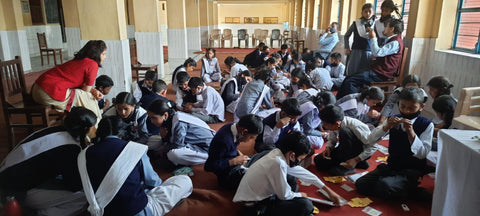by Akshatha Nayak
My husband's ancestral place lies in a village in Uttarakhand state of India. It lies in the Himalayas which is rich in natural resources and biodiversity, but also, is an extremely tough and vulnerable terrain at the same time. Being an ecologically sensitive area, infrastructural development takes a toll over its fragile ecosystem leading to frequent landslides and floods. Hence, the communities living in the region are often left with lack of advanced infrastructure, facilities and urban resources. Which also is the case for education. While the communities there have high regard for education, they are often left with fewer choices, mostly requiring migration to cities or give up quality education by staying back in the village.
Looking at the scope of frugal science in such area, I had discussed about Foldscope with my husband’s uncle during my visit last time and he being member of a local school committee was really delighted with the idea of their students having foldscopes and using them. Due to it's popularity, this school has students coming from as far as 8 km who trek daily on a mountain terrain. It's an extremely challenging terrain but they seemed to have mastered it, due to lack of alternatives. I could definitely not keep up with their steady pace of walking uphill, without facing breathlessness!

The school has a history of top performing students across the state. Although I don't always correlate a good school to best performing, the teacher-student relationship in this school was friendly and healthy, and not based on fear which I see in many other rural schools.
The teachers volunteered to actively participate in the workshop. They were really open to learning. The response from students and teachers in this workshop was beautiful with sheer excitement and listing the number of things they would want to explore after the workshop.

Yet, I had a heavy heart when students from other classes requested to attend and at least spectate the workshop but due to limited capacity of the space everyone could not be accommodated. However, a few foldscopes were kept in the school for the students and teachers to use later.
The school gifted me an ethnic clothing of Kumaoni culture, as an act of gratitude and considering me a part of their community!
Post the workshop, on my trek back to my stay, I see students with foldscopes sharing the tool with other students without the foldscopes on their way back home, while collecting pine nuts from their cones, lichens and insects around from pine trees for foldscoping!
The himalayas have been rich in biodiversity. Interestingly though, it has lost a large amount of its forests and many native species, post-British entry in the mountains, who promoted plantations of trees like pine and deodar, some of which are invasive species that have resulted in wiping out patches of himalayan biodiverse flora.

People in rural areas definitely have certain challenges but they have a deep sense of belongingness- to share and care for each other in the community. The children with foldscopes made a list of all the flora and fauna they wanted to observe through the microscope.


 Students observing stomata and algae under foldscope
Students observing stomata and algae under foldscope
Sharing a separate incident about children living in these himalayan mountains- on a trek, my husband and I were stuck uphill near a temple due to sudden stormy rains when an 8 year old girl, her younger brother and her grandma helped us with shelter and food until the weather was better. They accompanied us downhill as they were heading home too. And throughout the trek downhill, the young girl kept talking about almost every plant that came on the way.
Most of these plants were mountain plants which were unique to me. The seasonal fruits, the medicinal ones, what is used during allergies or on a wound/injuries as first aid, even the use of plant parts as alternative to some sport/utility equipments!
She gave us a beautiful biowalk with such amazing traditional knowledge as well as some cultural associations. I really wished I had foldscope then to give her one, but I didn't that time. I really wondered how far she could take her exploration through a tool like foldscope. She already had so much to start with! But I know her school and her village now, and will definitely head there with foldscopes on my next trip!

These children that live so close to nature, really deserve access to better tools for learning!



